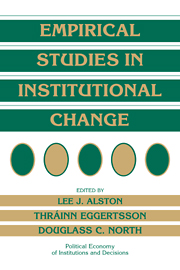Book contents
- Frontmatter
- Contents
- List of contributors
- Series editors' preface
- Acknowledgments
- Introduction
- A note on the economics of institutions
- Empirical work in institutional economics: an overview
- 1 Toward an understanding of property rights
- Economic variables and the development of the law: the case of western mineral rights
- 2 Impediments to institutional change in the former Soviet system
- Why economic reforms fail in the Soviet system: a property rights–based approach
- 3 Transaction costs and economic development
- Public institutions and private transactions: a comparative analysis of the legal and regulatory environment for business transactions in Brazil and Chile
- 4 The evolution of modern institutions of growth
- Constitutions and commitment: the evolution of institutions governing public choice in seventeenth-century England
- 5 Regulation in a dynamic setting
- The political economy of controls: American sugar
- 6 Price controls, property rights, and institutional change
- Roofs or stars: the stated intents and actual effects of a rents ordinance
- 7 Regulating natural resources: the evolution of perverse property rights
- Legally induced technical regress in the Washington salmon fishery
- 8 The politics of institutional change in a representative democracy
- A political theory of the origin of property rights: airport slots
- 9 The economics and politics of institutional change
- Paternalism in agricultural labor contracts in the U.S. South: implications for the growth of the welfare state
- Epilogue: economic performance through time
- Author index
- Subject index
- POLITICAL ECONOMY OF INSTITUTIONS AND DECISIONS
8 - The politics of institutional change in a representative democracy
Published online by Cambridge University Press: 05 June 2012
- Frontmatter
- Contents
- List of contributors
- Series editors' preface
- Acknowledgments
- Introduction
- A note on the economics of institutions
- Empirical work in institutional economics: an overview
- 1 Toward an understanding of property rights
- Economic variables and the development of the law: the case of western mineral rights
- 2 Impediments to institutional change in the former Soviet system
- Why economic reforms fail in the Soviet system: a property rights–based approach
- 3 Transaction costs and economic development
- Public institutions and private transactions: a comparative analysis of the legal and regulatory environment for business transactions in Brazil and Chile
- 4 The evolution of modern institutions of growth
- Constitutions and commitment: the evolution of institutions governing public choice in seventeenth-century England
- 5 Regulation in a dynamic setting
- The political economy of controls: American sugar
- 6 Price controls, property rights, and institutional change
- Roofs or stars: the stated intents and actual effects of a rents ordinance
- 7 Regulating natural resources: the evolution of perverse property rights
- Legally induced technical regress in the Washington salmon fishery
- 8 The politics of institutional change in a representative democracy
- A political theory of the origin of property rights: airport slots
- 9 The economics and politics of institutional change
- Paternalism in agricultural labor contracts in the U.S. South: implications for the growth of the welfare state
- Epilogue: economic performance through time
- Author index
- Subject index
- POLITICAL ECONOMY OF INSTITUTIONS AND DECISIONS
Summary
THE ECONOMIC SPHERE AND THE RULE-MAKING SPHERE
The following essay by William Riker and Itai Sened analyzes a fascinating case of institutional change: the evolution of property rights in time slots (the rights to land and to take off) at four heavily used U.S. airports. In these airports, the structure of rights in slots changed in 1969 from open access and queuing on a first-come, first-served basis to communal property governed by the established carriers. In 1985 the structure changed again, to exclusive salable property rights.
Riker and Sened take their analysis beyond the naive model of property rights, which examines the behavior of only economic actors and organizations (the demand side of institutional change), and strongly emphasize the role of political actors and organizations (the supply side). In other words, the study analyzes the behavior of actors in both the economic sphere and the rule-making or public-choice sphere, but not in the constitutional sphere, since the institutional change in question did not involve new procedures for public choice.
In society, the design of formal rules for granting property rights is ultimately the domain of the actors who control the state, because they (usually) have the resources and the will to determine the basic structure of property rights in their territory. Riker and Sened assume that these political actors act rationally and grant property rights in order to promote their own welfare, broadly defined to include individual wealth, power, and social ideals.
- Type
- Chapter
- Information
- Empirical Studies in Institutional Change , pp. 280 - 282Publisher: Cambridge University PressPrint publication year: 1996



